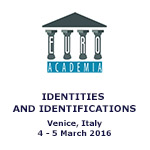Euroacademia Conferences
 Europe Inside-Out: Europe and Europeanness Exposed to Plural Observers (9th Edition) April 24 - 25, 2020
Europe Inside-Out: Europe and Europeanness Exposed to Plural Observers (9th Edition) April 24 - 25, 2020 Identities and Identifications: Politicized Uses of Collective Identities (9th Edition) June 12 - 13, 2020
Identities and Identifications: Politicized Uses of Collective Identities (9th Edition) June 12 - 13, 2020 8th Forum of Critical Studies: Asking Big Questions Again January 24 - 25, 2020
8th Forum of Critical Studies: Asking Big Questions Again January 24 - 25, 2020 Re-Inventing Eastern Europe (7th Edition) December 13 - 14, 2019
Re-Inventing Eastern Europe (7th Edition) December 13 - 14, 2019 The European Union and the Politicization of Europe (8th Edition) October 25 - 26, 2019
The European Union and the Politicization of Europe (8th Edition) October 25 - 26, 2019 Identities and Identifications: Politicized Uses of Collective Identities (8th Edition) June 28 - 29, 2019
Identities and Identifications: Politicized Uses of Collective Identities (8th Edition) June 28 - 29, 2019 The European Union and the Politicization of Europe (7th Edition) January 25 - 26, 2019
The European Union and the Politicization of Europe (7th Edition) January 25 - 26, 2019 7th Forum of Critical Studies: Asking Big Questions Again November 23 - 24, 2018
7th Forum of Critical Studies: Asking Big Questions Again November 23 - 24, 2018 Europe Inside-Out: Europe and Europeanness Exposed to Plural Observers (8th Edition) September 28 - 30, 2018
Europe Inside-Out: Europe and Europeanness Exposed to Plural Observers (8th Edition) September 28 - 30, 2018 Identities and Identifications: Politicized Uses of Collective Identities (7th Edition) June 14 - 15, 2018
Identities and Identifications: Politicized Uses of Collective Identities (7th Edition) June 14 - 15, 2018
The ‘Indispensable Nation’ in a Post-American World: American Exceptionalism and President Obama’s Post-American Vision of Hegemony
-
-

-
Presentation speakers
- Georg Löfflmann, Department of Politics and International Studies, University of Warwick, UK
- Download presentation
Abstract:
‘American exceptionalism’ is one of the distinct features of national identity construction in the United States, proposing the political and social uniqueness, historic difference, and material superiority of the country. Since its emergence as a global superpower at the end of World War II, this ideology of national exceptionalism was used to underwrite an activist US foreign policy, establishing a Washington consensus of liberal hegemony. Under the Obama administration however, this national identity discourse has become a contested ideological battleground between competing visions of exceptionalism and its meaning for America’s role in the world. Donald Trumps’ aggressive nativist nationalism is one of the latest examples in this ongoing conflict over defining America’s ‘greatness’ and the political consequences deriving from it. This paper explores the discursive performance and political significance of American exceptionalism under the Obama presidency, and its consequences for US foreign and security policy. It examines how American exceptionalism represents a key identity construct that is intertextually constituted and reconstituted between the language of political decision-making, the intellectual expertise in America’s strategic community of think tanks and policy experts, and reflections in popular media. A particular focus lies on the 2012 presidential campaign, and how diverging visions of American exceptionalism between Obama and Romney testified to competing ideas for American leadership in world politics, and the enduring effect of this conflict in American politics. The paper will further examine the cases of ‘leading from behind’ in Libya, the American military intervention in Syria, and US reactions to international crises concerning Ukraine and ISIS. The contextualization of these episodes in contemporary, geopolitical discourse reveals how the practice of US foreign and security policy under Obama is shaped by a conflicted and paradoxical vision of post-American hegemony that attempts to bring American exceptionalism in line with a less US-centric international system.
-
Related Presentations

Maintaining a Japanese Cultural Identity Abroad: ‘Old Japan’ at the Japanese Department Store ‘Shirokiya’ in Honolulu
- Jutta Teuwsen

Borders Objects: Dissolution or Exacerbation of Identity
- Sabine Du Crest













